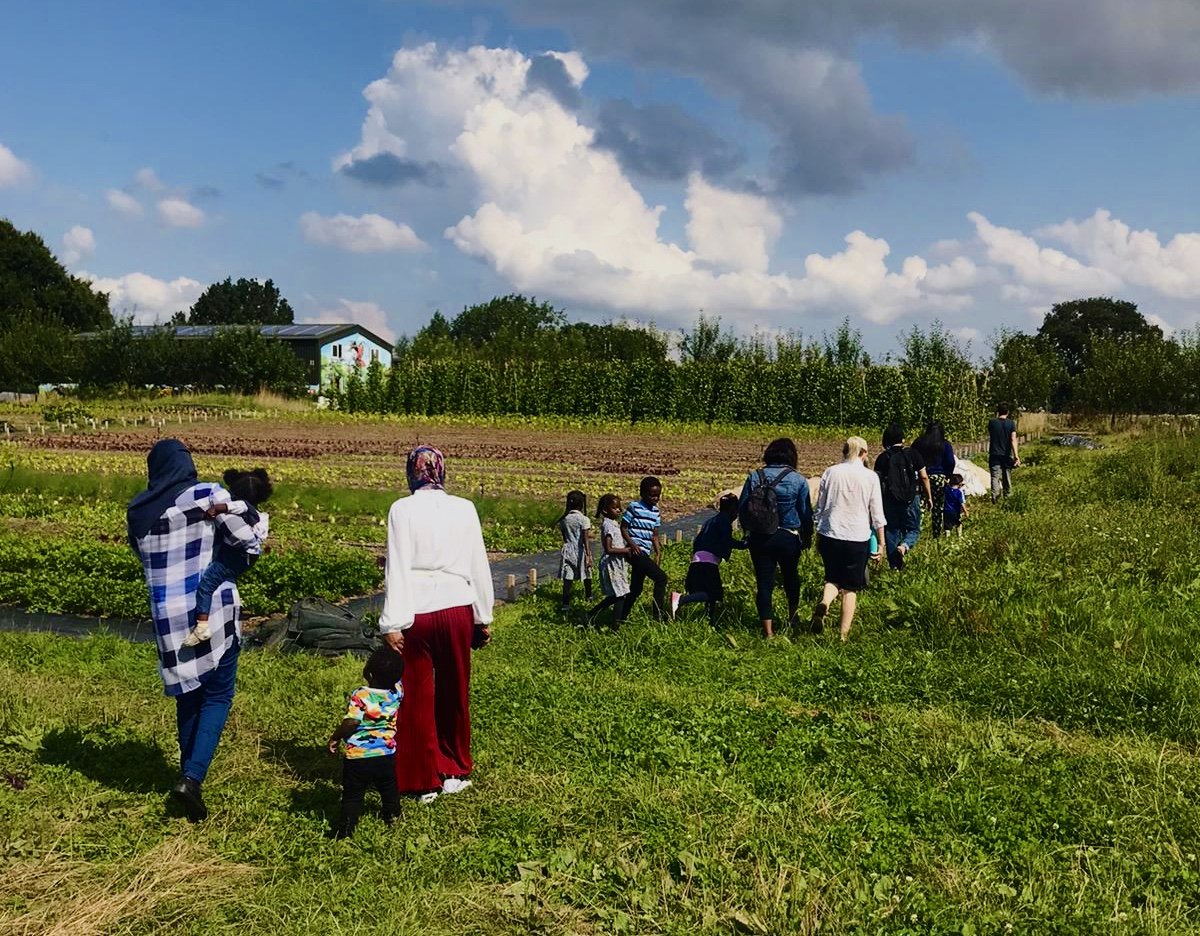Displacement & The UK Asylum System
About 120 million people have been forced to flee their homes. Every single one of these people did not simply leave a place, they left a belonging, a community, an identity.
They leave their present lives in search of safer ones.
37.6 MILLION
of these are refugees (people that have fled their countries due to conflict or persecution).
5
of the countries hosting the largest number of refugees are in Sub-Saharan Africa.
0.54%
of the UK’s population are refugees.
The reasons as to why someone migrates are multiple and complex.
Migration can be caused by economic prospects and difficulties, to reunite with relatives, or to receive an education. It could be that one has been forced to flee persecution or human rights violations. It could be due to droughts, fires, and other types of land degradation and climate emergencies. It could be because of political affliction, armed conflict, or other crises or violence. Or it could be that someone has been targeted because of who they are and what they believe in – for example, their ethnicity, religion, sexuality, gender identity, and/or political opinion.
People can be forcibly displaced internally (within their own countries) or internationally (outside their home countries border). When displaced interntationally, most seek refuge in neighbouring countries or aim to reach family elsewhere.
The search for safety can be very long, dangerous, and traumatising. Some people risk becoming victims of human trafficking, slavery, and other forms of exploitation. Some are detained by authorities for long periods of time. Many live in limbo with no right to work, little to live by, and the fear of being detained or deported. Some have started to settle and continue to face daily racism, xenophobia, and discrimination. Most people feel isolated and alone because they have lost their support networks and their previous known environment and life.
Definitions: Who is a refugee, an asylum seeker, and a migrant?
The experience of leaving their town, city, or country of origin does not capture who these displaced people are. Because of this, we need to see the individual rather than the label, and recognise that the terms ‘refugee’, ‘migrant’, and ‘asylum seeker’ are instituted terms and are temporary. Like all of us, these people’s identities, cultures, religions, and experiences are unique. A person’s legal status cannot express their full identity and personality.
There are millions of stateless people, who have been denied a nationality and lack access to basic rights such as health care, education, employment, and freedom of movement. Simply because these people don’t fit the legal definition of a refugee, they could still be in danger if they were to go home. They should be entitled to have their human rights protected and respected, regardless of the status they have in the place they moved to.
A Refugee
A refugee is a person who has fled their home country and has been granted protection to stay in another country. This is because the country they have been granted legal proctection in recognises that they were at risk of serious human rights violations, such as violence, conflict, war, or persecution for reasons of race, gender, religion, nationality, membership of a social group, or political opinion in their home country.
Globally, there are almost 37.4 million refugees, half of whom are under the age of 18. Refugees have a right to international protection under the 1951 Refugee Convention. If granted protection by the UK government, this usually will initially be for a period of 1 – 3 years.
For some Syrian, Afghan, and Ukrainian nationals the UK government has approved ‘Resettlement Schemes’, where people are granted refugee status on arrival. To who this applies to, how long they will be granted protection for, what support they will recieve, and their rights in the UK can vary and are unequal.
An Asylum Seeker
A person seeking asylum is someone who has been forcibly displaced from the country they were living in and is seeking protection from persecution and serious human rights violations, but who hasn’t been legally recognised as a refugee yet. This is because they are either going through the asylum process or are waiting to receive a decision on their asylum claim. Seeking asylum is a human right, everyone should be allowed to enter another country to seek asylum.
A Migrant
Despite there being no internationally accepted legal definition of a migrant, we understand these to be people staying outside their region or country of origin, who are not asylum-seekers or refugees.
Claiming Asylum and The Asylum Process
The Home Office expects people to claim asylum in the immigration office in Croydon as soon as they enter the UK. If this does not happen, the Home Office might say these people are not in real danger and require the person seeking asylum to explain why they did not claim asylum immediately, providing evidence where possible. As soon as they claim asylum they are interviewed to gather basic information about who they are and their journey.
Once asylum is claimed, there is a short interview called the ‘Screening Interview’, after which the person claiming asylum is sent an “ARC card”. This is a credit-card-sized plastic card with their photograph confirming that they are asylum-seekers. Sometime after the screening interview, there is an ‘Asylum Substantive Interview’. This is a long, in-depth interview where asylum seekers are expected to explain why they would be at risk if they returned to their countries of origin and provide strong evidence for this. If there is insufficient documentary evidence, the case relies on the person’s credibility. The Home Office routinely disbelieve and challenge cases that rely on credibility. The time periods between these two interviews can vary from months to a year.
Even then, the Home Office may take many months to years to take a decision on an asylum claim after the substantive interview. The inadmissibility rules introduced in January 2021 in response to Brexit and that can render an asylum claim “inadmissible” and unable to be considered in the UK, may lead to even more delays. It is very important, if possible, to have a lawyer during the asylum process.
If an asylum claim is refused, there may be the possibility to appeal the refusal in courts if the person in question can find new evidence to support their claim.
Accommodation and Financial Support
If, as an asylum seeker, you do not have anywhere to live or no money to support yourself, you should make the Home Office aware in your claim. You should be entitled to Home Office accommodation somewhere in the UK and a small amount of money.
Asylum seekers do not have a choice on where to live, or who with. If placed in a shared house they are entitled to £45 per week - making it £6.40 a day for food, sanitation and clothing. If placed in a hostel or hotel they are entitled to £9 per week. The waiting time to receive this is currently averaging six months.
In almost all cases, people seeking asylum will not be allowed to work. If found working illegally, they could be prosecuted and sent to a detainment centre.
If an asylum claim is refused, accommodation and financial support are usually suspended, unless they have children.
Reporting
While waiting upon a decision on their asylum claim or if a claim has been refused, some people may have to report to the nearest immigration office.
Detention
If a person seeking asylum is subject to “immigration control” it is possible that at some point during the legal process, they could be held in immigration detention. These detention centres, known officially as “Immigration Removal Centres”, are like prisons.
Up-to-date, legally accurate, and accessible information on the UK immigration and asylum system:
International Laws Protecting Refugees, Asylum Seekers, and Migrants
This is regardless of how and why they arrive in a country.
The Universal Declaration of Human Rights (Article 14), which states that everyone has the right to seek and enjoy asylum from persecution in other countries.
The 1951 UN Refugee Convention (and its 1967 Protocol), which protects refugees from being returned to countries where they risk being persecuted.
The 1990 Migrant Workers Convention, which protects migrants and their families.
Regional refugee law instruments (inc. 1969 OAU Convention, 1984 Cartagena Declaration, Common European Asylum System & Dublin Regulation).
Nationality & Borders Act
In July of 2021, the Nationality and Borders Bill was introduced to Parliament. It contains provisions about nationality, asylum, immigration, victims of slavery, and human trafficking.
The Government has stated that the reforms in the Bill are about saving lives and breaking the economic model of people smugglers. However, these claims have not been supported by evidence, nor do they properly take into account key context and detail about the current asylum system.
Through clause 11, the bill aims to introduce a discriminatory two-tier system of refugee protection dependent on travel routes to the UK. Refugees who travel to the UK through third countries and/or via irregular routes (like crossing the Channel in a small boat) will be given a new form of temporary protection with limited rights to welfare benefits and family reunion, and they’ll have their status reassessed after 30 months.
The Bill further aims to limit refugee family reunions for refugees who arrived in the UK after passing through a third country. This could affect many thousands of refugees each year, and severely curtail one of the main routes for refugees to arrive in the UK. It would also harm the integration chances of those who have been recognised as refugees in the UK. Government proposals to restrict family reunion for some refugees would see as many as 3,500 people per year being prevented from joining their families. On February 28, the Lords voted to remove clause 11 from the Nationality and Borders Bill.
Under provisions in Clause 9 of this Bill, individuals could be stripped of their British citizenship without warning. This is inconsistent with international human rights obligations.
On April 27th 2022 the Government’s Nationality and Borders Bill became an act of law. We are highly concerned about this cruel legislation that will undoubtedly cause harm.
Illegal Migration Act
In March 2023, the so-called “Illegal Migration Bill” was introduced to Parliament, with the aim of stopping people from crossing the English Channel in small boats. The Bill set out a plan that will mean that anyone who arrives irregularly into the UK will have their asylum claim deemed “inadmissible”—the Home Office won’t even consider someone’s claim. They could be detained indefinitely and then removed either to their own country or a “safe third country” if that’s not possible.
Changes made or in the pipeline under new labour government:
Scrapped Rwanda Scheme - but redirecting funds towards new Border security.
Gradual closure of Bibby Stockholme
Started processing ‘inadmissible’ claims









